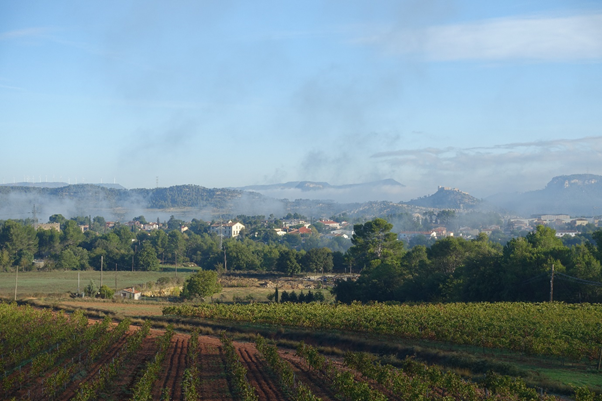| Timeline | From January 2019 to 31 December 2021 |
|---|---|
| Theme | Urban Futures |
| Countries | Austria, France, Germany |
| Funded by | NWO-SCIENCE via ERA-NET BiodivERsA & Belmont Forum |
| More info | http://www.secbivit.boku.ac.at/ |
Scenarios for providing multiple ecosystem services and biodiversity in viticultural landscapes (SECBIVIT)

Viticultural landscape in Spain (Photo: N. Schwarz).
In agroecosystems, many ecosystem services need to be balanced to achieve sustainable development goals and Aichi biodiversity targets.
Viticulture, the cultivation of grapes, is among the oldest and most profitable forms of agriculture. At the same time, it is one of the most intensive forms of agriculture, negatively affecting biodiversity and the benefits for people ecosystems generate. Climate change, the invasion of alien (pest) species and globalisation all affect viticultural landscapes; in addition to policies at the local, landscape and regional level. Th SECBIVIT project will develop and test model frameworks that integrate various land use and biodiversity scenarios across spatial scales for future management in the viticultural regions of Spain, France, Germany, Austria and Romania. The interdisciplinary research combines qualitative and quantitative approaches, using focus group meetings with key stakeholders, on-farm experiments, system dynamics modelling, agent-based modelling, and big-data analysis.
The project consortium
The SECBIVIT project consortium encompasses partners from Austria (The University of Natural Resources and Life Sciences - BOKU), France (Institut national de la recherche agronomique - INRA), Germany (Julius Kühn Institute - JKI, The University of Koblenz · Landau, and University Göttingen), Romania (University of Agriculture Science and Veterinary Medicine Cluj Napoca), Spain (Consejo Superior de Investigaciones Científicas - CSIC), USA (University of California Davis - UCD), and the Netherlands (University of Twente | Faculty ITC). The project is funded by a joint call of the Belmont Forum and the ERA-NET BiodivERsA network, which aims to strengthen research on climate scenarios for biodiversity and ecosystem services. The team at at University of Twente includes project coordinator Dr. Nina Schwarz (PGM), advisor Dr. Louise Willemen (NRS), and researcher Dr. Yang Chen (PGM).
Objectives
The SECBIVIT project will develop and test different model frameworks to explore alternative forms of grape cultivation to better balance grape production, biodiversity conservation and ecosystem service supply for different climate and policies scenarios in various European viticultural regions. ITC will be in charge of modelling how winegrowers’ decision making on pest management and soil conservation practices in these scenarios will impact biodiversity and ecosystem services.
In detail, the project plans
- To develop spatially explicit and locally adapted ABMs based on existing data and stakeholder-driven scenarios integrating winegrowers as agents who take land use decisions in coupled human-natural systems;
- To develop a model that quantifies multiple biodiversity-related ES and their interactions in viticultural landscapes to identify pareto-optimal land use management strategies under the current socio-economic system;
- To quantify effects of local and landscape-scale land-use decisions on multiple ES such as pest control, soil fertility, carbon sequestration and nature conservation value to validate the model for analysing trade-offs and synergies between biodiversity and ES under different ecological, economic and market conditions;
- To implement a software decision-support tool for stakeholders in viticulture that provides information on how to manage their crop to enhance biodiversity and multiple ES in a given context.
Outcome
The results of the project will encompass both re-usable scientific as well as management resources and outcomes fit to be used as basis for further investigation and management. Products such as scientific articles, datasets and software will be provided on Open Source platforms whenever possible.



